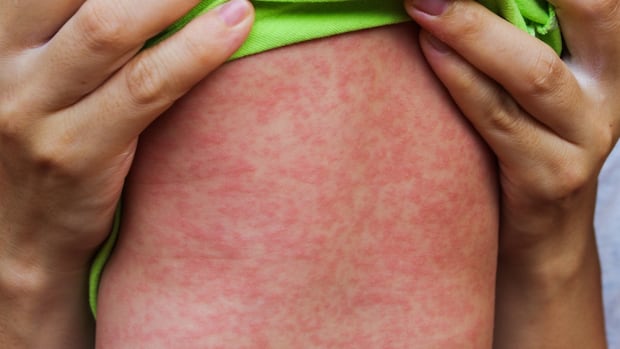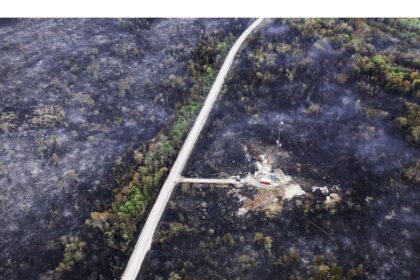ManitobaManitoba confirmed 12 more cases of measles in its weekly update posted online Wednesday, with the total number of confirmed cases now up to 158 from 146 the previous week.7 cases this year have required hospitalization — and 1 person ended up in intensive care, Shared Health saysCBC News · Posted: Jul 23, 2025 3:52 PM EDT | Last Updated: 2 hours agoCanada achieved measles elimination status in 1998, but imported cases have resulted in outbreaks that started in New Brunswick in October. (Phichet Chaiyabin/Shutterstock)Manitoba confirmed 12 more cases of measles in its weekly update posted online Wednesday, with the total number of confirmed cases now up to 158 from 146 the previous week.Those numbers are up-to-date as of July 19, the province said. Manitoba also reported an additional probable case of the illness in its most recent update, in addition to eight other probable cases earlier this year — four in April and four in June.The number of cases spiked in May, with 72 reported that month. So far in July, the province has recorded 39 confirmed cases and one probable case.A provincial spokesperson said last week there had been seven measles cases in Manitoba that required hospitalization this year as of July 5. One person required admission to the intensive care unit, the spokesperson said in an email on July 17.Canada achieved measles elimination status in 1998, but imported cases have resulted in outbreaks that started in New Brunswick in October.As of July 12, there have been a total of 3,977 measles cases — 3,665 confirmed and 312 probable — across 10 jurisdictions in Canada this year, according to the latest data from Health Canada.The highly infectious disease spreads through droplets formed in the air when someone coughs, sneezes or talks. Even a few minutes in the same space as a sick person poses infection risks, as the virus can linger on surfaces for two hours after an infected person leaves.Symptoms of measles generally appear seven to 21 days after exposure, and may include a fever, runny nose, drowsiness and red eyes, Manitoba Health said. Small white spots can also appear on the inside of the mouth or throat.Measles screeningEarlier this week, a spokesperson for Shared Health said active measles screening began at Health Sciences Centre Children’s Hospital’s neonatal intensive care unit (NICU) on July 7 to minimize the risk of an outbreak.Similar screening began at ambulatory care clinics on July 14, the spokesperson said in an email July 21.That screening was implemented to ensure patients and families stay safe as measles cases spread within the community, the spokesperson said, adding people should stay at home if they’re feeling sick.Visitors entering the NICU complete screening in the reception area, which the spokesperson said is “geographically distant” from the patient care area.Pediatric intensive care unit screening, meanwhile, is done through an intercom in the family waiting room that’s separated from the care area. Screening includes questions about possible symptoms and if the visitors have a rash.At the Health Sciences Centre’s Women’s Hospital, screening is done through the intercom system before someone enters a unit, or at reception before they enter the patient care space.Patients with appointments at the ambulatory care clinic who have the measles or have been exposed to the virus and feel sick should call the clinic about their appointment before going, the spokesperson said. And if someone gets to a facility while showing symptoms of the measles, screening staff will consult with infectious disease physicians and infection control professionals to determine the appropriate next steps, the statement said.ImmunizationImmunization is the only way to protect people from contracting measles, the province said.A two-dose measles vaccine program for measles, mumps, rubella and varicella (chickenpox) is routinely provided for kids who are at least one year old, with the second dose given between the ages of four to six in Manitoba. If a child is exposed to measles, the province said a second dose can be given earlier.Manitoba has expanded eligibility for vaccines to infants as young as six months old living in the Southern Health region and the Interlake-Eastern Regional Health Authority area.The province also extended vaccine eligibility to start at six months for children who were evacuated from their communities because of wildfires and who may be staying in southern Manitoba, where there have been measles outbreaks.A list with detailed information on the locations, times and days where the public might have been exposed to measles is available on the province’s website.
Thursday, 5 Feb 2026
Canada – The Illusion
Search
Have an existing account?
Sign In
© 2022 Foxiz News Network. Ruby Design Company. All Rights Reserved.
You May also Like
- More News:
- history
- Standing Bear Network
- John Gonzalez
- ᐊᔭᐦᑊ ayahp — It happened
- Creation
- Beneath the Water
- Olympic gold medal
- Jim Thorpe
- type O blood
- the bringer of life
- Raven
- Wás’agi
- NoiseCat
- 'Sugarcane'
- The rivers still sing
- ᑲᓂᐸᐏᐟ ᒪᐢᑿ
- ᐅᑳᐤ okâw — We remember
- ᐊᓂᓈᐯᐃᐧᐣ aninâpêwin — Truth
- This is what it means to be human.
- Nokoma











